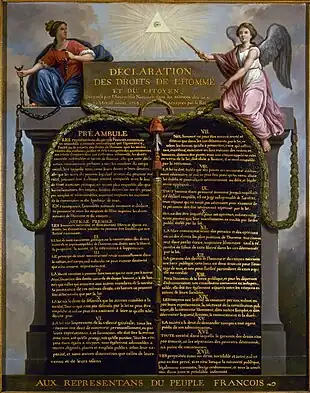Adrienne de La Fayette
Marie Adrienne Françoise de Noailles, Marquise de La Fayette (2 November 1759 – 25 December 1807), was a French marchioness. She was the daughter of Jean de Noailles and Henriette Anne Louise d'Aguesseau.[1] In 1774, she married Gilbert du Motier, Marquis de Lafayette, who left France in 1776 to volunteer in the American Revolutionary War where he served under General George Washington, then later became a key figure in the French Revolution of 1789.
Adrienne de Noailles | |
|---|---|
| Marquise de La Fayette | |
 | |
| Born | 2 November 1759 Hôtel de Noailles, Paris, Kingdom of France |
| Died | 25 December 1807 (aged 48) Auvergne, France |
| Spouse(s) | |
| Issue | Henriette du Motier Anastasie Louise Pauline du Motier Georges Washington Louis Gilbert du Motier Marie Antoinette Virginie du Motier |
| Father | Jean de Noailles |
| Mother | Henriette Anne Louise d'Aguesseau |
Early life and family
They had four children: Henriette du Motier (15 December 1775 – 3 October 1777), Anastasie Louise Pauline du Motier (1 July 1777 – 24 February 1863), Georges Washington Louis Gilbert du Motier, (24 December 1779 – 29 November 1849), and Marie Antoinette Virginie du Motier (17 September 1782 – 23 July 1849).
She was a great-granddaughter of Françoise Charlotte d'Aubigné, niece of Madame de Maintenon.[2][3]
Imprisonment and planned execution
In 1795, the Marquise de LaFayette was imprisoned and facing execution. Elizabeth Monroe, a future First Lady of the United States and wife to James Monroe, the United States envoy to France, intervened in an attempt to save her. The day prior to La Fayette's scheduled execution, Mrs. Monroe visited the imprisoned marquise and loudly announced that she would be returning the following day. Not wanting to endanger ties with the United States, France abruptly reversed its verdict and did not execute her.
Notes
- Guilhou 1918, p. 11.
- Now The Saint James Albany Hotel-Spa, 202 Rue de Rivoli
- Unger 2002, p. 22.
References
- Baker, James Wesley (1977). "The Imprisonment of Lafayette". American Heritage. 28 (4): 1–4.
- Burton, June K. (26 January 2001). "Two "Better Halves" in the Worst of Times – Adrienne Noailles Lafayette (1759–1807) and Fanny Burney d'Arblay (1752–1840) as Medical and Surgical Patients under the First Empire" (PDF). Archived from the original (PDF) on 13 March 2016. Retrieved 18 February 2009.
- Chaffanjon, Arnaud (1976). La Fayette et sa descendance. Berger Levraud.
- Chisholm, Hugh, ed. (1911). . Encyclopædia Britannica. Vol. 16 (11th ed.). Cambridge University Press. pp. 65–67.
- Cloquet, Jules Hippolite (1835). Recollections of the Private Life of General Lafayette: Embellished with Numerous Engravings as in the Original Paris Edition. Baldwin. p. 227.
- Crawford, Mary MacDermot (1907). Madame de Lafayette and Her Family. J. Pot & Company. pp. 11, 165–166.
- Crawford, Mary MacDermot (1908). The Wife of Lafayette. E. Nash. p. 297.
- Griffith, Thomas Waters (1898). Latimer, Elizabeth Wormeley (ed.). My Scrap-book of the French Revolution. A. C. McClurg. pp. 393.
- Guilhou, Marquerite (1918). Life of Adrienne D'Ayen: Marquise de La Fayette. R. F. Seymour.
Adrienne de La Fayette.
- Kaminsky, John (2005). A Necessary Evil?: Slavery and the Debate of the Constitution. Rowman & Littlefield. ISBN 0-945612-33-8.
- Lamb, Martha; Pond, Nathan Gillett (1881). Stevens, John Austin; DeCosta, Benjamin Franklin; Johnston, Henry Phelps (eds.). The Magazine of American History with Notes and Queries. A. S. Barnes. p. 353–357.
- Maurois, André (1961). Adrienne: The Life of the Marquise de La Fayette. Translated by Hopkins, Gerard. originally written in French
- Miller, Melanie Randolph. Envoy to the Terror.
- Morris, Gouverneur; Morris, Anne Cary (1888b). The Diary and Letters of Gouverneur Morris. Vol. II. C. Scribner's Sons.
- Nelson, Paul David (2005). Francis Rawdon-Hastings, Marquess of Hastings: Soldier, Peer of the Realm, Governor-General of India. Fairleigh Dickinson University Press. p. 55. ISBN 978-0-8386-4071-5.
- Roberts, Cokie (2008). Ladies of Liberty. William Morrow. p. 327. ISBN 978-0-06-078234-4.
- Senior, Nassau William (1880). Conversations with Distinguished Persons During the Second Empire. p. 21.
- Sichel, Edith Helen (1900). The Household of the Lafayettes. A. Constable. p. 71.
- "Portraits / His friends: Francisque de Corcelle". Alexis de Tocqueville 1805. 15 October 2005. Retrieved 27 December 2016.
- Unger, Harlow Giles (2002). Lafayette. John Wiley & Sons. ISBN 0-471-39432-7.
Further reading
- Gottschlk, Louis (2007). Lafayette Comes to America. Read Books. pp. 27. ISBN 978-1-4067-2793-7.
- Lane, Jason (2003). General and Madame de Lafayette: Partners in Liberty's Cause in the American and French Revolutions. Taylor Trade Publishing.
- Maurois, André (1961). Adrienne; ou, La vie de Madame de La Fayette. Hachette.
- Morris, Gouverneur; Morris, Anne Cary (1888). The Diary and Letters of Gouverneur Morris. Vol. I. C. Scribner's Sons.
- "Books: An 18th Century Marriage". Time. 26 May 1961. Archived from the original on 1 October 2007.
Collections
- Letter from Adrienne de Lafayette to her Children, The 17th Brumaire, November 1794
- John Jay letter to Adrienne Lafayette, 13 August 1785
- Gouverneur Morris letter to Adrienne Lafayette, 19 December 1796
- Lafayette Family Papers, University of Maryland
- National Museum of Women in the Arts Archived 1 March 2012 at the Wayback Machine
- Généalogie de Carné, Alain de Carné en novembre 2006
- Neil Jeffares, Dictionary of pastellists before 1800, Noailles Iconographical Genealogy
- The Marquis de Lafayette collection, Cleveland State University
- Marie Joseph Paul Yves Roch Gilbert du Motier, Marquis de Lafayette Collection, Library of Congress

